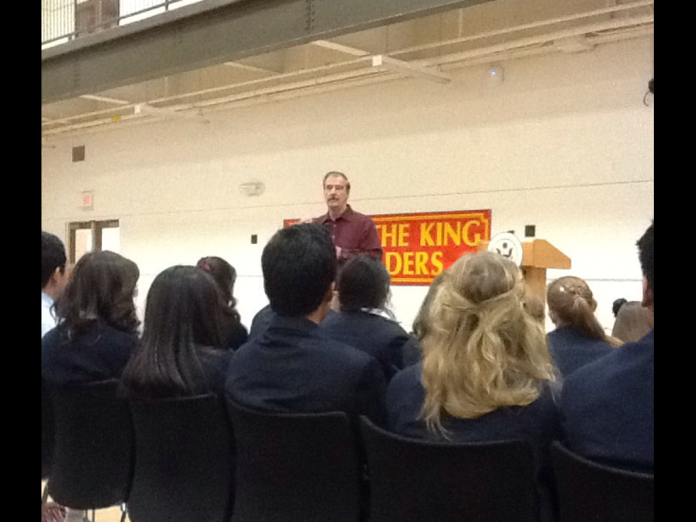From president of Coca Cola in Mexico to President of Mexico itself, Vicente Fox has led a successful life, but professing never to have forgotten the less fortunate and always committed to the betterment of the people. On Nov. 8, some 20 Jesuit students from debate, student council, and the senior contemporary issues course heard Fox speak on numerous topics at Christ the King Catholic School. Christ the King pupils, along with students from John Paul II, Bishop Dunne, and Ursuline also attended.
Fox began with a 30 minute talk, explaining how he began as a truck driver for Coca Cola and eventually worked his way up to president of the company in Mexico. Earning a degree from Harvard Business School, he found great success in the business world but did not feel like he was making enough of an impact. Striving to solve problems of poverty and exclusion, Fox entered the political arena in the PAN party, which had not fielded a successful presidential candidate against the ruling PRI party in over 100 years. Fox won election as president in 2000, serving until 2006.
He was not particularly interested in giving great details about his life, however, and spoke more about the importance of education and Catholic values. “Education is a key factor for happiness and well-being and for having income,” Fox explained. Catholic schools in particular help build “ethics, moral behavior, good citizenship, mutual respect, and most importantly compassion.”
One major problem Fox faced in Mexico was the low percentage of kids who would reach higher education. He gave some statistics: out of 100 children who start in basic school, 90 finish this six-year schooling, 70 of these kids finish their three years of high school (high school is only three years in Mexico), 40 kids of this original group finish their three years of secondary school (a level above high school but before college), and a mere 24 of these original 100 students finish college. For this reason, Fox made education a key point in his administration but was “totally unsatisfied” with what he accomplished, stressing that there will always be more work to be done.
Always wanting to do more, Fox expressed desires that embody the ideal Jesuit student who constantly seeks the Magis, and later he told of how his own Jesuit education shaped his life. The motto “Men for Others” really spoke to Fox, who said, “That principle has been the guidance of my life.” Assistant Principal Fred Donahue said he “loved [this] extended plug for Jesuit education.” He also spoke of the Spiritual Exercises and encouraged the audience to take five minutes of silence every day to contemplate how they could serve the community and help others (similar to the Examen).
Because of the wide age range in the audience (from parents to high school students to second graders), Fox hit on a variety of different points. He reminded everyone not to forget to “give gifts that you have.”
For the final 30 minutes, Fox took questions. James Ferrara ’14 asked about Pemex (the state-run petroleum company which has a monopoly on oil in Mexico). Fox explained that he tried to change this because of Pemex’s inefficiency and the fact that “government does not create jobs, the private sector does.”
“I enjoyed the opportunity to listen to such an inspirational speaker,” said Parker Rice ’14, a student in Mr. Casey Profitt’s contemporary issues class. Mr. Profitt explained why he brought his class, “I wanted them to hear this message that the world has problems and it needs committed, passionate, and talented young people to first be aware of the problems and then to be dedicated to playing some positive role.”
Debate Coach, Dr. Tracy McFarland took the debate team because they are debating about economic engagement with Cuba, Venezuela, and Mexico. “Because of Fox’s background as a president of Coke as well as well as his unique political trajectory, we knew he would speak to economic elements of Mexican politics.”
As a whole, the speech was plenty inspirational but somewhat lacking in focus. It did, however, offer students the opportunity to hear from an enormously influential man who has tried to put Jesuit teachings into practice in all aspects of his life.






